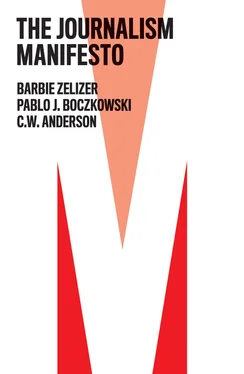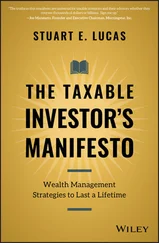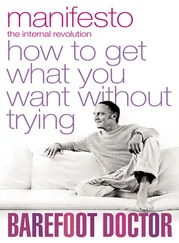1 Cover
2 Series Page The Manifesto Series David Buckingham, The Media Education Manifesto Natalie Fenton, Des Freedman, Justin Schlosberg and Lina Dencik, The Media Manifesto Silvio Waisbord, The Communication Manifesto Barbie Zelizer, Pablo J. Boczkowski and C. W. Anderson, The Journalism Manifesto
3 Title Page The Journalism Manifesto Barbie Zelizer, Pablo J. Boczkowski and C. W. Anderson polity
4 Copyright Copyright © Barbie Zelizer, Pablo J. Boczkowski and C. W. Anderson 2022 The right of Barbie Zelizer, Pablo J. Boczkowski and C.W. Anderson to be identified as Authors of this Work has been asserted in accordance with the UK Copyright, Designs and Patents Act 1988. First published in 2022 by Polity Press Polity Press 65 Bridge Street Cambridge CB2 1UR, UK Polity Press 101 Station Landing Suite 300 Medford, MA 02155, USA All rights reserved. Except for the quotation of short passages for the purpose of criticism and review, no part of this publication may be reproduced, stored in a retrieval system or transmitted, in any form or by any means, electronic, mechanical, photocopying, recording or otherwise, without the prior permission of the publisher. ISBN-13: 978-1-5095-4265-9 A catalogue record for this book is available from the British Library. Library of Congress Control Number: 2021938632 The publisher has used its best endeavors to ensure that the URLs for external websites referred to in this book are correct and active at the time of going to press. However, the publisher has no responsibility for the websites and can make no guarantee that a site will remain live or that the content is or will remain appropriate. Every effort has been made to trace all copyright holders, but if any have been overlooked the publisher will be pleased to include any necessary credits in any subsequent reprint or edition. For further information on Polity, visit our website: politybooks.com
5 Epigraph “Listen: Billy Pilgrim has become unstuck in time.” Kurt Vonnegut, Jr., Slaughterhouse-Five
6 Acknowledgments Acknowledgments This book started in London, one stormy Sunday morning in late autumn of 2018, when Mary Savigar at Polity Press approached one of us with the proposal of writing a book on journalism for the new Manifesto series. A lot has happened to each of us in our personal lives, as well as to the world, between that day and when we submitted the final version of this manuscript in the spring of 2021. We alternated fascinating conversations with periods of silence. We supported each other when life got in the way of work by one of us spontaneously taking the lead when the others needed a break. We wrote and edited each other’s words to the point that we could guess each other’s thoughts and finish each other’s sentences. We started this project animated by the diversity of our viewpoints and wrapped it up with a fusion of our ideas. We ended up cherishing the manuscript, but even more our friendship. Through it all, Mary, Stephanie Homer and Ellen MacDonald-Kramer at Polity Press graced us with outstanding support and unparalleled patience. We could not have hoped for a better editorial team. We are also grateful for the helpful feedback given by the anonymous reviewers solicited by Polity. Last, but not least, this book would not exist without the countless conversations each of us has had with other scholars, practitioners, sources and members of the public over the past few decades. A lot of what we know and how we think about journalism is the outcome of these conversations. We hope the resulting text does some justice to how much each of you has taught us, and sparks new conversations in return.
7 1 Journalism in the Imagination and on the Ground
The disarray of institutions
Journalism in institutional disarray
Institutional interfaces
Conclusion
8 2 Elites
The crack up of the elites
Why trust declines when elites crack up
The crack up of responsibility
Indexing and the spheres of political discourse
Conclusion
9 3 Norms
Why norms?
What norms offer institutions
Norms of journalism
A triad of irrelevancies
Conclusion
10 4 Audiences
Assumed and taken for granted audiences
Known and uncertain audiences
Recoupling audiences and journalistic practices
Conclusion
11 5 Reform or Revolution?
The reformist path
The revolutionary path
Towards a journalism that matters
12 Bibliography
13 End User License Agreement
1 Cover
2 Table of Contents
3 Series Page
4 Title Page
5 Copyright
6 Epigraph
7 Acknowledgements
8 Begin Reading
9 Bibliography
10 End User License Agreement
1 ii
2 iii
3 iv
4 v
5 viii
6 ix
7 1
8 2
9 3
10 4
11 5
12 6
13 7
14 8
15 9
16 10
17 11
18 12
19 13
20 14
21 15
22 16
23 17
24 18
25 19
26 20
27 21
28 22
29 23
30 24
31 25
32 26
33 27
34 28
35 29
36 30
37 31
38 32
39 33
40 34
41 35
42 36
43 37
44 38
45 39
46 40
47 41
48 42
49 43
50 44
51 45
52 46
53 47
54 48
55 49
56 50
57 51
58 52
59 53
60 54
61 55
62 56
63 57
64 58
65 59
66 60
67 61
68 62
69 63
70 64
71 65
72 66
73 67
74 68
75 69
76 70
77 71
78 72
79 73
80 74
81 75
82 76
83 77
84 78
85 79
86 80
87 81
88 82
89 83
90 84
91 85
92 86
93 87
94 88
95 89
96 90
97 91
98 92
99 93
100 94
101 95
102 96
103 97
104 98
105 99
106 100
107 101
108 102
109 103
110 104
111 105
112 106
113 107
114 108
115 109
116 110
117 111
118 112
119 113
120 114
121 115
122 116
123 117
124 118
125 119
126 120
127 121
128 122
129 123
David Buckingham, The Media Education Manifesto
Natalie Fenton, Des Freedman, Justin Schlosberg and Lina Dencik, The Media Manifesto
Silvio Waisbord, The Communication Manifesto
Barbie Zelizer, Pablo J. Boczkowski and C. W. Anderson, The Journalism Manifesto
Barbie Zelizer, Pablo J. Boczkowski and C. W. Anderson
polity
Copyright © Barbie Zelizer, Pablo J. Boczkowski and C. W. Anderson 2022
The right of Barbie Zelizer, Pablo J. Boczkowski and C.W. Anderson to be identified as Authors of this Work has been asserted in accordance with the UK Copyright, Designs and Patents Act 1988.
First published in 2022 by Polity Press
Polity Press
65 Bridge Street
Cambridge CB2 1UR, UK
Polity Press
101 Station Landing
Suite 300
Medford, MA 02155, USA
All rights reserved. Except for the quotation of short passages for the purpose of criticism and review, no part of this publication may be reproduced, stored in a retrieval system or transmitted, in any form or by any means, electronic, mechanical, photocopying, recording or otherwise, without the prior permission of the publisher.
Читать дальше












